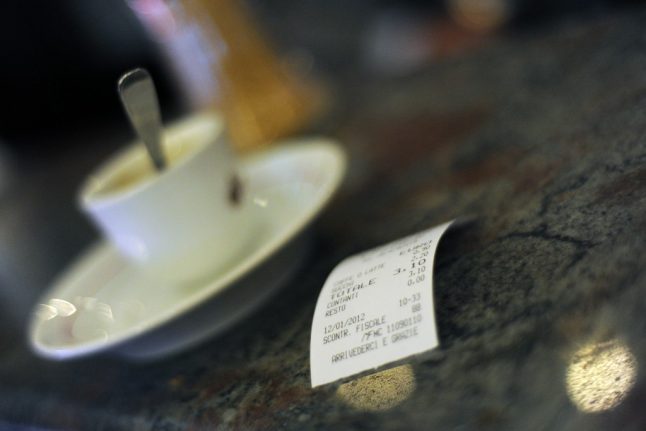According to a photo of a recent receipt from Caffè Vaticano, opposite the Vatican in the west of the city centre, the visitors were presented with a bill for €81.40 for two hamburgers, one double americano and two double cappuccinos – plus a service charge of €7.40.
They're far from the first unhappy diners to complain about the cafe online. Its TripAdvisor page – where it's rated just 1.5 out of 5 – is littered with photos of eye-watering bills, which appear to show €5 cappuccinos, €6 bottles of water, €12 muffins and €15 fruit salads.
READ ALSO: Tell us – How can tourists avoid being ripped off in Italy?
No doubt the cafe's location allows it to continue attracting hungry tourists despite the bad reviews: it lies just opposite the entrance to the Vatican Museums, where visitors are likely to find themselves looking for sustenance before joining the hefty queues.
Establishments in Italy's tourist hotspots are notorious for overcharging: horror stories include a €43 bill for two coffees and two bottles of water at a cafe by St Mark's Square in Venice, a €1,100 meal for four – without wine – at another restaurant in the vicinity, a single cone of ice cream that cost €25 in Florence, and a €42 check for three gelati and some water near the Trevi Fountain in Rome.
READ ALSO:
- Twelve authentic spots to eat and drink on a budget in Venice
- Where to get great street food in Florence
- How to spot good quality gelato in Italy – and how to suss out the fakes
In some cases patrons have won redress after complaining (or asking their tour guide to complain) to the police, or after shaming rogue establishments in the media. Italy's finance police can hand out fines to businesses that don't clearly and accurately display their prices, or to those that don't give customers a receipt.
The best solution, though, is to avoid tourist traps altogether. Be wary of establishments directly next to big attractions or those where touts try to hustle you inside, and if in doubt, ask to see a menu or check TripAdvisor before sitting down. Best of all, seek recommendations from experienced travellers or locals: I've listed a few of my own below.
The Local's picks for where to eat near the Vatican
I lived next to the Vatican when I first moved to Rome and never had a problem getting a well-priced coffee or bite to eat.
Here are a few of my favourites in the neighbourhood:
-
Pergamino Caffè – just a stone's throw from St Peter's in Piazza del Risorgimento, this specialist coffee roaster charges just €1 for an (excellent) espresso at the bar.
-
Be.Re – right next door is this great craft brew pub, which serves gourmet sandwiches from the Rome chain Trapizzino for a quick and affordable snack.
-
Bonci Pizzarium – there's a branch of Rome's rightfully famous pizza-by-the-slice joint just five minutes' walk from the Vatican Museums, but be warned, it gets busy.
-
Fábrica – this charming cafe in an old factory serves tea and pastries by day, and by evening a delicious aperitivo that easily makes a light dinner. Don't miss the tea-flavoured cocktails.
- Fischio – my former local, this outdoor kiosk-bar remains one of my favourite places in Rome to get a coffee or spritz. You'll have to shell out all of €1.10 for a cappuccino.
Have you ever been ripped off in Italy? Got any top tips for avoiding tourist traps? Get in touch.



 Please whitelist us to continue reading.
Please whitelist us to continue reading.
Member comments